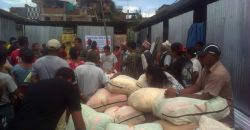Nepal response moves to long-term recovery

People lining up at The Salvation Army's distribution sign-in.
The Salvation Army's International Emergency Services team has been heavily involved in rebuilding the lives of thousands of Nepalese people since major earthquakes struck the country six months ago.
Earthquakes of up to 7.8-magnitude damaged or destroyed more than 700,000 dwellings in and around the capital Kathmandu, with the loss of more than 8500 lives.
After a huge relief effort, The Salvation Army's International Emergency Services team is starting to close down its operations in the country and hand over responsibility for the “recovery” elements of Salvation Army work to a new projects and development team.
Nine projects have already been completed and closed, with seven more being wound down. The last emergency team member is scheduled to depart Kathmandu on 5 November, when a new team will move in with the specific task of working alongside local Salvation Army leaders and members to continue their community ministry in a country that is still coming to terms with the disaster. Six new long-term projects are already in preparation.
The Salvation Army has provided food, tarpaulins and tents; built temporary learning centres and houses; constructed septic tanks and toilets for camps, communities and schools; managed refugee camps; provided thousands of quilts and blankets, hundreds of hygiene kits and kitchen sets, clothing and school books. Sometimes it has acted independently and at other times with trusted Nepalese non-governmental organisation (NGO) partners, whose intimate knowledge of Nepalese culture and resources have informed the team's actions and increased the value of each dollar spent.
The head of the new projects and development team, Captain Richard Vanlalnghaka from India Eastern Territory, is already in place and working with the emergency team members to learn about the most pressing needs and to ensure as smooth a handover as possible.
International Emergency Services worker Mary Jane Phelan, from USA Eastern Territory, says there is a mixed feeling about scaling down relief operations. “A desire to somehow make it all right lingers, but the International Emergency Services team leaves the country having changed thousands of lives and with an enormous sense of gratitude for the support it has received.”
Report courtesy of IHQ
Comments
No comments yet - be the first.